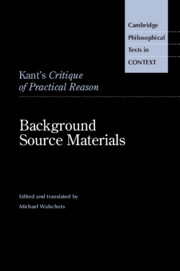Book contents
- Kant’s Critique of Practical Reason
- Kant’s Critique of Practical Reason
- Copyright page
- Dedication
- Contents
- Preface
- Acknowledgements
- General Note on Citations and Translations
- General Introduction
- Part I Pre-Kantian Moral Philosophy
- Part II Between the Critiques
- 3 Johann Friedrich Flatt
- Review of the Groundwork (1786)
- 4 Gottlob August Tittel
- On Herr Kant’s Reform of Moral Science (1786)
- 5 Hermann Andreas Pistorius
- Review of Schultz’s Elucidations of Professor Kant’s Critique of Pure Reason (1786)
- 6 Hermann Andreas Pistorius
- Review of the Groundwork (1786)
- 7 Thomas Wizenmann
- ‘To Herr Professor Kant’ (1787)
- Part III The Reception of the Critique of Practical Reason
- Bibliography
- Index
4 - Gottlob August Tittel
Introduction
from Part II - Between the Critiques
Published online by Cambridge University Press: 31 January 2025
- Kant’s Critique of Practical Reason
- Kant’s Critique of Practical Reason
- Copyright page
- Dedication
- Contents
- Preface
- Acknowledgements
- General Note on Citations and Translations
- General Introduction
- Part I Pre-Kantian Moral Philosophy
- Part II Between the Critiques
- 3 Johann Friedrich Flatt
- Review of the Groundwork (1786)
- 4 Gottlob August Tittel
- On Herr Kant’s Reform of Moral Science (1786)
- 5 Hermann Andreas Pistorius
- Review of Schultz’s Elucidations of Professor Kant’s Critique of Pure Reason (1786)
- 6 Hermann Andreas Pistorius
- Review of the Groundwork (1786)
- 7 Thomas Wizenmann
- ‘To Herr Professor Kant’ (1787)
- Part III The Reception of the Critique of Practical Reason
- Bibliography
- Index
Summary
Gottlob August Tittel (1739–1816) was a professor at a Gymnasium in Karlsruhe and is best known as an early critic of Kant’s theoretical and practical philosophy. This chapter contains selections from his On Herr Kant’s Reform of Moral Science (1786), the first book-length commentary on the Groundwork. In this text, Tittel makes several important objections to the Groundwork, many of which have since become classic, such as: that the categorical imperative is empty, that the motive of duty for duty’s sake is impotent in human nature, and that Kant is a covert consequentialist. Tittel’s most famous objection, however, is that the categorical imperative is not a new principle of morality, but merely a new formula of a principle philosophers have known for a long time. Kant was aware of the Reform, and he responds to Tittel in a footnote in the Preface to the second Critique (see 5:8.28–37n).
- Type
- Chapter
- Information
- Kant's Critique of Practical ReasonBackground Source Materials, pp. 93 - 95Publisher: Cambridge University PressPrint publication year: 2024

